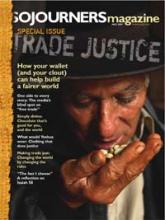When we think of trade, most of us consider it the fiefdom of governments and multinational corporations -it seems a horribly complicated topic that's impossible to understand, let alone do anything about. But here's the bottom line: Trade is about relationships.
Think about that T-shirt you're wearing. Maybe the cotton is grown and spun into yarn in Pakistan, and then sent to Haiti to be knit, cut, and sewn into T-shirts -which are then sent to England for printing, packaging, and shipping to points all over the world. Imagine the people who are involved at each stage. Who are they? Are they fairly paid? Do they have enough food and medicine? Do they work in safe facilities? Do they have a voice in how their time and labor is used?
Our clothes -or coffee, jeans, and virtually everything else we consume- can tell a story, and it's often a scary one. It's no surprise that when trading partners sit at the negotiating table, wealthy countries benefit far more than poor countries. Our writers examine the reasons for this, but also how we can change the structures that perpetuate this injustice. The good news is that there is a whole world (literally) of fairly traded products out there, and hundreds of ways we can learn about and support policies that uplift, rather than oppress, people all over the world.
"I put on righteousness, and it clothed me," Job told his friends. "My justice was like a robe and a turban" (Job 29:14). Perhaps one day we'll be able to say of the shirt we hold up to our friends, "This T-shirt helped send an 8-year-old Zambian girl to school."
- The Editors
Read the Full Article
